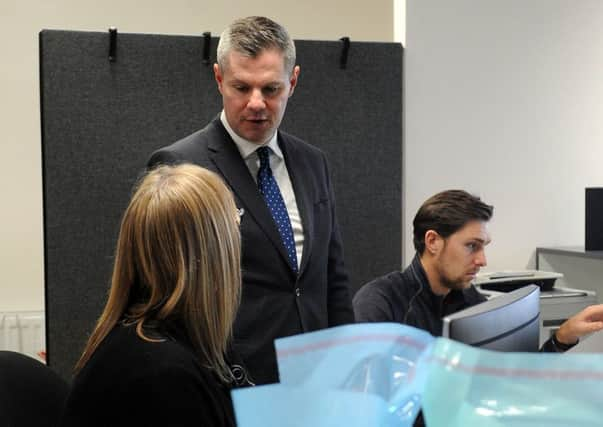Scotland goes it alone on historic day as MSPs back tax shake-up


The minority SNP government won support from the Greens for a package that will mean Scots workers earning £26,000 or more face a higher tax burden then their counterparts south of the Border. Earners below this level, a majority of workers, will pay slightly less.
MSPs voted 67-50 in favour of the new system and are today expected to pass the Scottish Government’s budget for 2018-19, which will be underpinned by the tax plans.
Advertisement
Hide AdAdvertisement
Hide AdFinance Secretary Derek Mackay said the £200 million raised by the tax changes will help fight austerity and provide vital cash for public services.
But opponents said the move broke an SNP election pledge not to raise the basic rate of income tax and would hurt rather than spark Scotland’s sluggish economy.
Scottish finance leaders said the changes mark a major shift in policy between Scotland and the rest of the UK.
Stephen Hay, head of tax in Scotland with accountancy giant RSM, said: “Today’s decision, although not unexpected, signals a pivotal moment for Scotland. Not only will the decision pave the way to introduce a five-rate system for the first time, it presents further tax divergence between Scotland and the rest of the UK.”
Moira Kelly, chair of the Scottish technical committee of the Chartered Institute of Taxation in Scotland, said: “Today is a historic day in Scotland’s devolved tax journey but the price to pay for exercising these powers will be increased complexity for almost all Scottish taxpayers.”
Scots earning up to £33,000 will pay less tax than last year under the plans. But above this level, workers face a rise.
The Finance Secretary told MSPs: “Our progressive approach to reforming income tax will deliver greater tax fairness and protect the lowest-earning taxpayers in Scotland.
“By using our devolved income tax powers we will ensure we have an additional £428 million next year to support a Budget that will help mitigate UK budget cuts, protect our NHS and other public services, support our economy and tackle inequality in our society.
Advertisement
Hide AdAdvertisement
Hide Ad“This is an important day for Scotland’s future and I hope parliament comes together to back our proposals and set income tax rates that will help deliver the best outcomes for the people of Scotland.”
Mr Mackay’s plans will see two extra bands added to the income tax system, on either side of the basic rate – a 19p “starter” rate for lower earners and a 21p “intermediate” rate for those on middle incomes. This, coupled with an increase to the tax-free allowance included in the UK budget, will see 70 per cent of Scots pay less tax in the coming year than they do now, while 30 per cent will pay more.
The changes will also add 1p to each of the higher and additional rates, making them 41p and 46p respectively, while limiting increases to the higher rate threshold to raise extra funds for local services and a public sector pay deal.
A deal struck with the Greens paved the way for the SNP’s spending passage through Holyrood. The budget will increase funding for the NHS by £400m, back small businesses and innovation, invest in the expansion of early learning and childcare, support the building of 50,000 homes and provide essential funding for public services.
SNP figures believe the changes will still make Scotland a “more attractive place to live”, even for higher earners who may face bigger tax bills. As well as the better public services, Nationalists point to the universal services enjoyed by Scots such as free university tuition, free prescriptions and concessionary travel for over-60s.
But the Conservatives at Holyrood hit out at the broken pledge and said tax hikes would not help stimulate growth at a time when Scottish growth is struggling behind the rest of the UK. “This rise in income tax penalises hard-working Scottish families,” Tory finance spokesman Murdo Fraser said.
“And, in making Scotland the highest-taxed part of the UK, it will condemn us to more years of sluggish economic growth, depriving the government of much-needed tax revenue as a result.”
Labour claims the tax changes do not go far enough and called for even steeper rises to tackle austerity.